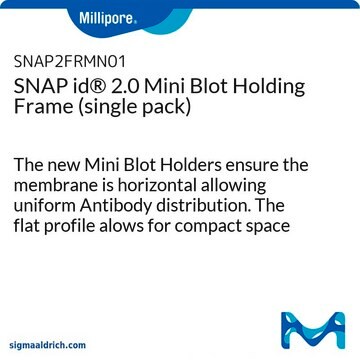SNAP2RL
SNAP id® 2.0 Blot Roller
New Blot Roller specially designed for use with the SNAP i.d. 2.0 system.
About This Item
Recommended Products
Quality Level
manufacturer/tradename
SNAP id®
technique(s)
western blot: suitable
compatibility
for use with Commercially available blocking reagents
for use with Luminata Western HRP Substrates
for use with Nitrocellulose
for use with PVDF (Immobilon membranes)
for use with blØk<TMSYMBOL></TMSYMBOL>-CH Buffer (cat. no. WBAVDCH01)
for use with blØk<TMSYMBOL></TMSYMBOL>-FL Buffer (cat. no. WBAVDFL01)
for use with blØk<TMSYMBOL></TMSYMBOL>-PO Buffer (cat. no. WBAVDP001)
for use with commercially available detection reagents
detection method
chemiluminescent
colorimetric
fluorometric
shipped in
ambient
storage temp.
room temp
Application
Legal Information
Certificates of Analysis (COA)
Search for Certificates of Analysis (COA) by entering the products Lot/Batch Number. Lot and Batch Numbers can be found on a product’s label following the words ‘Lot’ or ‘Batch’.
Already Own This Product?
Find documentation for the products that you have recently purchased in the Document Library.
Customers Also Viewed
Protocols
The SNAP i.d. 2.0 Protein Detection System is the second generation of the SNAP i.d. method for detecting immunoreactive proteins on Western blots.
Western blotting involves protein separation by gel electrophoresis, protein transfer to a polyvinylidene difluoride (PVDF) or nitrocellulose membrane, and detection by various methods.
Western blotting involves protein separation by gel electrophoresis, protein transfer to a polyvinylidene difluoride (PVDF) or nitrocellulose membrane, and detection by various methods.
Western blotting involves protein separation by gel electrophoresis, protein transfer to a polyvinylidene difluoride (PVDF) or nitrocellulose membrane, and detection by various methods.
Our team of scientists has experience in all areas of research including Life Science, Material Science, Chemical Synthesis, Chromatography, Analytical and many others.
Contact Technical Service









